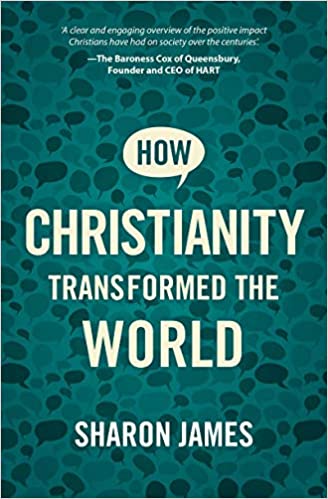An Author Interview from Books At a Glance
Just what kind of impact has Christianity had in the world? It’s a great question,
and the answer may be even better than you think.
I’m Fred Zaspel, and welcome to another Author Interview here at Books At a Glance. Today we are talking to Sharon James about her wonderful new book, How Christianity Transformed the World.
Sharon, welcome, and congratulations on an excellent and timely new book!
James:
Thank you so much for the opportunity to speak to you again, Fred.
Zaspel:
It is rather clear from your title but explain for us what is your book is all about.
James:
Since the inception at the church at Pentecost, we have a great story to tell. Christ and his true followers throughout history have followed his injunction to love God and love neighbor. That has had an enormously positive impact on all aspects of human life.
Zaspel:
Why did you write this book? Explain how this area of study is particularly relevant for us at this point in our culture and history – and how it may even cut across the grain of current thinking.
James:
We are living in a real culture war. Many people are being fed the narrative that Christianity through history has been a toxic and oppressive influence and is to be seen as the enemy. Of course, there are examples of behavior that we would in no way condone. But overall, we do have a great story to tell. When you really dig into it there are so many inspiring and encouraging examples of well-known and ordinary people sacrificing themselves. I felt it was worth it to investigate and explore to put that good story out there.
Zaspel:
You mention up front, as Tom Holland has demonstrated at some length, that the foundations of a free and prosperous society are deeply religious, and that Christianity, in particular, is to be thanked for it. Just in broad perspective, how is that so?
James:
There are two things that are fundamental. One is that we believe God creates every single human in his image. Every person is to be treated with dignity and respect. We believe in the sanctity of human life from conception to natural death. We see the dignity of human life because our Lord Jesus Christ became incarnate. He was human from the moment of conception. The second radical thing is the teaching of the Bible that compassion, care, and service of others is not an option, but an obligation. That compassion is to be extended to all. Again, the Lord Jesus was a supreme example of laying down his life for others. True greatness comes through service. Those two planks lie at the heart of what we would regard as a concern for human rights. You cannot have the profound concern for human rights without that rock solid foundation.
Zaspel:
Let’s chase that a bit further – talk to us about the creation mandate and other reasons why we should expect that Christianity would have a positive impact on the world.
James:
I enjoyed writing the chapters on education and work ethic. When you look at pagan culture, they believe in education but for the elite, not for slaves. Wherever Christianity spreads globally one of the first things they have done is to educate boys and girls. All humans are created to know and love their creator. We do that by reading his Word, everyone should be able to read. Many today really disparage wealth creation. You cannot have human flourishing without wealth creation. That goes back to Genesis. Pagan culture disparaged manual work and said that elite could get by without work. The Christian worldview sees God as the original worker. He created us in his image with a capacity and desire to create. We flourish when we allow that freedom to work and create.
Zaspel:
Before we talk about the positive impact of Christianity, we must admit that our critics are right in alleging that professing Christians have been intolerant and are guilty of various kinds of injustices, so how do you respond?
James:
We admit in the past in the name of Christ injustices have sometimes been wrongly perpetrated. We must distinguish nominal or institutional religion from real living Christianity. We need to remember that the biblical truths of common grace mean that Christians do not have a monopoly of virtue and compassion. We sometimes find non-Christians showing extraordinary altruism and compassion. But again, the big picture is that we have a great story to tell. The true followers of Jesus Christ have lived out the command to love God and neighbor.
Zaspel:
Right! And any abuses you can point out by professing Christians have to be understood as against the principles of the Christ they profess.
James:
Absolutely! And we have also to remember that when you look at those regimes which deny the existence of God have been responsible for the worst human rights abuses.
Zaspel:
Tell us how you pursue your agenda and maybe give us an overview of your book and the various topics you highlight.
James:
I begin with the topic of freedom. People are so concerned with it today. The biblical worldview defends freedom. I then dig deeper into religious liberty. I show that it lies at the heart and foundation of other freedoms. Justice is another big hot topic of today. I show how the biblical worldview rests on the belief that God is the God of justice and he expects humans to treat each other justly. He will call us to account on the last day whether we have done so.
There is a whole chapter on protecting life. Another on the dignity of women. Then I look at the topics of philanthropy and healthcare. I cover education for all, the creation mandate, and the value of work. I conclude with a chapter explaining that Christians have a positive view of history. God is sovereign over history, it is not random events. There was a beginning there will be an end. Ultimately, we believe Jesus Christ is King of Kings and Lord of Lords.
Zaspel:
Let’s take just a couple of samples. Many people seem to assume that Christianity is repressive to women. Tell us what you have to say in chapter 5.
James:
Some people say that the coming of the Lord Jesus was the turning point for women in history. When you look at the early church for example their sexual ethic of purity was a very liberating thing. Women were appallingly abused in the ancient world. They were very much the recipients of sexual abuse. Christianity lay behind the pushing back of the horrible acceptance of sexual exploitation that was common in the ancient world. Fast forward to today. Sadly there are more sex slaves and trafficking than ever before. Christians oppose and are at the forefront to rescue women and children from those situations of abuse. Christianity has very much been good news for women.
Zaspel:
First, chapters 1 and 2 of your book – tell us how Christianity has promoted freedom and religious liberty.
James:
When you look at slavery for example the truth that slavery has been endemic in every culture in human history. But Christianity is the religion that insists theologically that humankind is made in the image of God. We cannot, then, properly own another human being. We are all made by God. I trace that story out. Thinking on religious liberty, right from the very start there was the idea that we owe earthly rulers certain things. But Caesar is not God. If you say every human must have the right to a free conscience, that strikes the hammer blow at tyranny. Christians in many cases have stood out against tyranny. We have great biblical principles that God is God of our conscience.
Zaspel:
What would our world look like today if it had not been for Christianity?
James:
God in common grace restrains evil and puts systems such as human governments and families in place. But, beyond the blessings of common grace, the blessings of the Gospel have been so widespread. We do live in a fallen world. There is sin and suffering. But wherever Christ’s followers have gone they are willing to sacrifice to help others in desperate situations. The world is an immeasurably more beautiful, healthy, and educated place because of the influence and impact of Christ followers.
Zaspel:
And the idea of healthcare has Christian roots.
James:
Yes. We are aware of the importance of the Nicene Creed. Churches all over the world recite it. We often forget that the great council of Nicaea also ruled that hospitals should be built in every town where there was a Christian cathedral. They recognized Jesus’ compassion for the sick and needy. Christians were responsible for caring for the sick and building hospitals.
Zaspel:
We are talking to Sharon James about her delightful new book, How Christianity Transformed the World. It is well-informed, it’s engagingly written, and it’s a very helpful and timely resource for Christians in our cultural moment. Buy a copy and enjoy!
Sharon, thanks so much for your good work, and thanks for talking to us today.
James:
It has been great to talk. Thank you so much.

